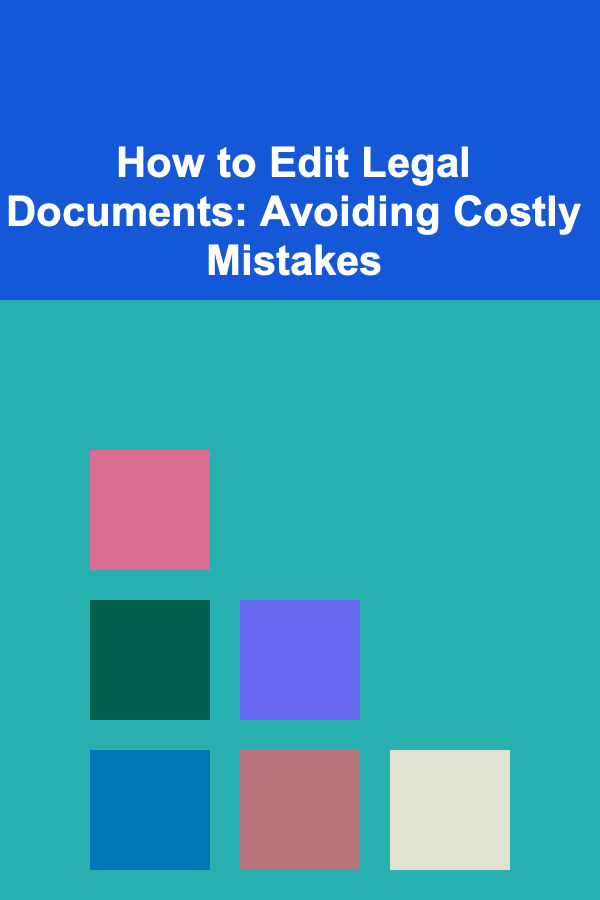
How to Edit Legal Documents: Avoiding Costly Mistakes
ebook include PDF & Audio bundle (Micro Guide)
$12.99$5.99
Limited Time Offer! Order within the next:

Editing legal documents requires precision, attention to detail, and a deep understanding of the legal language and framework involved. A seemingly minor error can lead to significant consequences, including legal disputes, financial losses, and damage to one's reputation. Whether you're a lawyer, a business owner, or someone reviewing a legal document for personal reasons, knowing how to edit legal documents correctly is crucial. This article will provide a comprehensive guide on how to edit legal documents, ensuring you avoid costly mistakes and maintain the integrity of the document's content.
The Importance of Editing Legal Documents
Legal documents are not like other types of documents. They are created to protect interests, establish rights, and define responsibilities, often with legal weight behind them. A small mistake, whether it is a typographical error, incorrect date, or ambiguous wording, can render a contract unenforceable or cause an unintended outcome. Proper editing ensures clarity, accuracy, and compliance with the relevant laws, and it helps prevent unnecessary litigation.
1. Legal Binding Power
Legal documents, such as contracts, wills, or business agreements, carry binding power. If a document is poorly drafted or contains errors, it could create loopholes or conditions that one party did not intend. The result could be an unenforceable contract, leading to costly litigation.
2. Legal Compliance
Legal documents must comply with local, state, and federal laws. Editing legal documents requires knowledge of the jurisdiction's legal requirements to avoid making errors that could make the document invalid.
3. Clarity and Precision
Legal language is often intricate and specific. Misunderstanding or misinterpreting legal jargon can result in ambiguity, which could be problematic if the document is called into question in a courtroom or dispute resolution process. Editing ensures the document is clear, precise, and easy to understand for all parties involved.
4. Protecting Rights and Interests
The primary purpose of legal documents is to protect rights and interests. Editing is an essential step in ensuring that the terms and conditions are fair, equitable, and well-defined. This avoids any unfavorable clauses that could place one party at a disadvantage.
Key Considerations When Editing Legal Documents
When editing a legal document, it's important to take a step-by-step approach, considering several key factors. Here are the primary considerations:
1. Understand the Purpose of the Document
Each legal document has a specific purpose, whether it's a contract, will, lease agreement, or memorandum of understanding. Understanding the purpose of the document will help you focus on the most relevant aspects that need to be reviewed and edited.
Actionable Steps:
- Identify the Objective: Determine what the document aims to achieve. Is it to formalize an agreement, make a legal statement, or resolve a dispute?
- Review the Context: Understand the broader context surrounding the document. Are there ongoing negotiations, legal disputes, or other factors influencing the document?
2. Check for Legal Terminology and Definitions
Legal documents often rely on precise terminology. Using incorrect terms or vague language can lead to misinterpretation. Ensure that the document uses legal terminology correctly and that terms are clearly defined.
Actionable Steps:
- Verify Definitions: Ensure that terms are consistently defined throughout the document. If the document introduces any legal term, define it the first time it appears.
- Avoid Ambiguities: Look for terms that could be interpreted in multiple ways, such as "reasonable," "best efforts," or "as soon as possible." These should be clearly defined within the context of the document.
3. Review for Consistency
Legal documents must be consistent in both content and language. Inconsistencies in terms, dates, or obligations can create confusion and potential conflicts.
Actionable Steps:
- Cross-Reference Clauses: Ensure that references within the document are consistent. For example, if you refer to "Party A" in one clause, ensure that all references to that party are the same throughout the document.
- Consistency in Formatting: Check the formatting for consistency. This includes font size, heading styles, and punctuation. A professional format contributes to the document's credibility and clarity.
4. Check for Missing or Incomplete Information
Legal documents often require specific information, such as names, dates, and signatures. Missing or incomplete details can render the document invalid or unenforceable.
Actionable Steps:
- Fill in Gaps: Ensure that all placeholders are properly filled out. This includes personal information, dates, terms, and other essential elements.
- Verify Dates and Numbers: Double-check all dates, numerical values, and calculations for accuracy. A miscalculation or incorrect date can change the meaning or enforceability of the document.
5. Ensure Legal Compliance
Every jurisdiction has its own set of rules for legal documents, such as formatting requirements or mandatory clauses. Ensure that the document adheres to these requirements to avoid potential legal challenges.
Actionable Steps:
- Research Local Laws: Verify the legal requirements in your jurisdiction. Some contracts may require notarization, signatures from witnesses, or specific wording.
- Check for Required Clauses: Some documents, such as wills or contracts, require specific clauses to be legally binding. Ensure all required language is included.
Common Mistakes to Avoid When Editing Legal Documents
While editing legal documents, there are common pitfalls that many people overlook. Identifying and avoiding these mistakes will help ensure the accuracy and validity of the document.
1. Vague Language
One of the most frequent errors in legal documents is using vague or overly broad language. Words like "reasonable," "best efforts," or "as soon as possible" can be interpreted in multiple ways, leading to confusion or disputes.
How to Avoid:
- Define Key Terms: Clearly define any vague terms or conditions.
- Use Precise Language: Opt for specific language that leaves little room for interpretation. For example, instead of "reasonable efforts," state "diligent efforts" or "within 10 business days."
2. Overlooking Standard Clauses
Many legal documents require certain standard clauses, such as a dispute resolution clause, confidentiality clause, or force majeure clause. Omitting these clauses can make the document incomplete or unenforceable.
How to Avoid:
- Include Necessary Clauses: Always include common clauses based on the type of document. For example, contracts often need a governing law clause and a termination clause.
3. Using Outdated Templates
Legal templates may become outdated due to changes in the law. Using an outdated template without checking its validity can result in errors that render the document ineffective.
How to Avoid:
- Use Current Templates: Always verify that the legal template you're using is up-to-date with the latest legal standards and requirements.
- Consult Legal Professionals: If in doubt, consult a lawyer to ensure the template's clauses are valid.
4. Ignoring Formatting and Readability
Legal documents often need to be easy to read and follow, especially in cases where non-lawyers will review them. Poor formatting can make a document difficult to navigate, leading to confusion and mistakes.
How to Avoid:
- Maintain Consistency: Use consistent formatting for headings, subheadings, and body text. This helps readers find key sections quickly.
- Use Clear Paragraphs: Avoid long, dense paragraphs. Break up text into smaller, digestible sections with clear headings.
5. Neglecting to Proofread
Even after carefully editing the content, errors can still slip through. Neglecting to proofread can leave minor mistakes unnoticed, such as typographical errors or inconsistencies in formatting.
How to Avoid:
- Proofread Thoroughly: Always read through the document at least once after editing. Reading it aloud can help you catch errors you may have missed.
- Have Someone Else Review: A fresh set of eyes can help identify errors you may have overlooked.
Best Practices for Editing Legal Documents
To edit legal documents effectively, adopting a systematic approach is essential. Here are some best practices:
1. Develop a Checklist
Create a checklist of the most common elements to review, such as legal terminology, consistency, formatting, and compliance with laws. This will help you stay focused and ensure you don't overlook key details.
2. Take Breaks Between Edits
Editing legal documents requires intense focus, and it can be easy to overlook mistakes if you've been working on a document for a long time. Take short breaks to refresh your mind and come back with a clearer perspective.
3. Use Legal Software
Legal editing software can help streamline the process. Tools like Grammarly or ProWritingAid can catch common grammar and spelling mistakes, while legal-specific software like Westlaw or LexisNexis can help ensure your language is precise and compliant with legal standards.
4. Consult Legal Professionals
When in doubt, always consult a legal professional. While editing can be done independently, certain documents, especially complex ones like contracts or wills, may require the expertise of a lawyer.
Conclusion
Editing legal documents is a critical skill that requires careful attention to detail, a strong understanding of legal language, and an ability to think critically about the content. By following the steps and strategies outlined in this article, you can minimize costly mistakes and ensure that your legal documents are both effective and enforceable. Whether you're drafting a contract, reviewing a will, or finalizing a business agreement, the ability to edit legal documents with precision and accuracy is invaluable. Always remember that when in doubt, consulting with a legal professional can help safeguard against errors that could have serious repercussions.
Reading More From Our Other Websites
- [Home Party Planning 101] How to Plan Fun Themes for a Home Party That Go Beyond the Basics
- [Digital Decluttering Tip 101] The Ultimate Cloud Cleanup: How to Organize, Archive, and Secure Your Online Files
- [Home Party Planning 101] How to Prepare Gluten-Free Party Recipes for Inclusive Gatherings
- [Personal Financial Planning 101] How to Understand Inflation and Protect Your Finances from Its Impact
- [Hiking with Kids Tip 101] How to Build a Kid-Safe Hiking First-Aid Kit: A Step-by-Step Guide
- [Home Party Planning 101] How to Create a Signature Drink for Your Party
- [Personal Care Tips 101] How to Use a Toothbrush to Maintain Healthy Gums
- [Home Cleaning 101] How to Clean Stainless Steel Appliances: Tips for a Sparkling Kitchen
- [Home Maintenance 101] How to Perform Seasonal Home Maintenance: A Step-by-Step Guide
- [Organization Tip 101] Why You Should Set Up a Donation Box in Your Home

How to Add a Touch of Elegance to Your Holiday Decor
Read More
How to Incorporate Eco-Friendly Practices into Your Renovation
Read More
How to Safely Use Electrical Appliances in Your Home
Read More
The Social Media Manager's Guide: Mastering Platforms and Strategy for Success
Read More
How To Master Speaking on Camera
Read More
How to Run a Dice Rolling Tournament: A Step-by-Step Guide
Read MoreOther Products

How to Add a Touch of Elegance to Your Holiday Decor
Read More
How to Incorporate Eco-Friendly Practices into Your Renovation
Read More
How to Safely Use Electrical Appliances in Your Home
Read More
The Social Media Manager's Guide: Mastering Platforms and Strategy for Success
Read More
How To Master Speaking on Camera
Read More